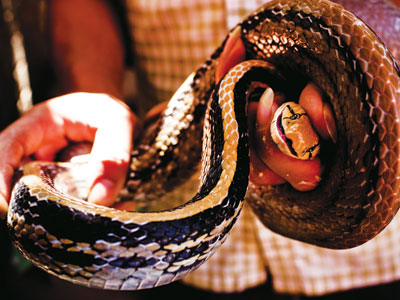Get off the Eaten Track
Bravado in every bite, strength in every sip. A visit to the Snake Village might seem worthy of a brag, but it undermines everything environmentalists are trying to accomplish in this country
For environmentalists in Vietnam, reminders they face a near impossible task are everywhere. However, one particular group expected an Old Quarter bar to be a safe haven.
They had spent their day discussing how to reverse the country’s taste for endangered wildlife. Understandably they hadn’t anticipated their evening escape would see them face to face with a whole new foe. But suddenly the bar filled with backpackers — perhaps as many as 50 of them — most of them a little worse for wear. It turns out they had just returned from a nearby snake restaurant.
As the environmentalists regrouped in another bar the realisation that they had a new problem to counter hit hard.
Snake in the Grass
If you haven’t eaten snake then the elements of the ritualistic meal are usually the same. The snake is killed in front of the guests. Its “still beating heart” is flopped into a shot glass and downed with rice wine. Also consumed is its blood and bile before the snake is chopped up and prepared for cooking.
Long popular with locals, the growth of snake eating among young visitors has seemingly been the culmination of a number of factors.
For many it was backpacker bible book turned into film The Beach that first documented the habit, but it was the YouTube generation that made it a traveller must. Type “snake” and “Vietnam” into a Google Video search and you’ll get over 1,500 results — the vast majority showing snake blood and bile drinking.
For Doug Hendrie, a technical advisor at Education for Nature Vietnam (ENV), the snake restaurants have the same problems as the more generic wildlife restaurants. While it’s easy for them to claim that what they are serving is farmed, rather than illegally caught, there are no guarantees and it’s impossible to prove one way or another.
“Backpackers may be happy to drink the blood of common snakes that may or may not be farmed, but there are frequently less common, less legal items on offer,” he says, “That may be the protected King Cobra or it could just as well be other endangered species”.
He adds: “For tourists to get involved only backs up the arguments of those people who believe that animals are a resource that should be allowed to be served up without restrictions.”
Scott Roberton, the British country representative of US NGO Wildlife Conservation Society, has his own take on just why people eat wildlife.
“For backpackers it’s bravado and travel tales, it’s not the tasting of a nation’s cuisine,” he says. “They may not believe that the beating heart of a snake will ‘make them strong’, but they are excited by the experience.”
For Scott, who first came to Vietnam 10 years ago as a young environmental volunteer, it’s been interesting to see changes in attitudes that have impacted the country’s environment.
“There’s a danger that the positive influence environmental campaigners are having locally can be undone by wider international factors,” he says. “We know that when it comes to stopping the trafficking of rhinos and tigers we enjoy popular public support. At the same time locals, westerners and the media often fail to see the link between the organized wildlife crime groups and the cliché of the old man pedalling ancient remedies in a dusty old shop in the Old Quarter. But, as with the snake restaurant, it’s all part of that same industry.”
Traveller Tales
In the world of the traveller “extreme eating” is big news. You’ll find the snake eating ritual on Lonely Planet’s YouTube page. Even Anthony Bourdain ate at a wildlife restaurant on a trip to Vietnam. The Travel Channel later removed the offending segment following pressure from conservationists.
Robyn Eckhardt is a professional food writer and former Ho Chi Minh City resident, now living in Malayisa. To her, such extreme eating is not of interest even if it’s still popular with many commissioning editors.
“As a travel writer I think this kind of coverage is irresponsible,” she says. “You're encouraging people to consume wild animals without telling them how to avoid eating endangered species. And really, in these cases there's no way to be absolutely sure that what you're eating isn’t endangered. We go on about the Chinese and their consumption of shark's fins and tiger penises — is eating the heart of a snake of indeterminate origins much different? Why would I want to encourage that sort of behaviour?”
Doug Hendrie at ENV believes that, despite widespread negativity over Vietnam’s environment, there are grounds for optimism although time is running out.
“There’s a new generation of young Vietnamese people who aren’t drinking bear bile or eating wildlife,” he says. “We are slowing down the depletion of Vietnam’s wildlife — the question, however, is what will be left by the time we’ve seen wholesale changes?”
According to Doug, for the backpackers it’s all about education. “I want to see the guidebooks be clear about what they shouldn’t eat,” he explains. “I want people to understand why extreme eating is idiocy. We never expected western backpackers to become an issue.”
Presumably if this snake-eating fad can grow to such heights thanks to travellers’ tales both on and offline, surely this much-needed education can spread just as quickly using the very same means.
Written by Steve Jackson. Photos by Aaron Joel Santos
~~~~~~~~~~~~~~~~~~~~~~~~~~~~~~~~~~~~~~~~~~~~~~~~~~~~~~~~~~~~~~~~~~~~~~~~~~~~~~~~~~~~~~~
Republished with the kind permission of The Word HCMC

- 10739 reads
- Printer-friendly version

